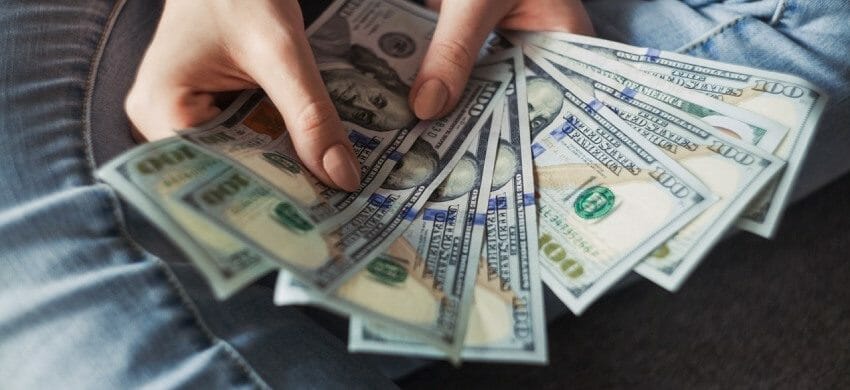Last Updated: March 21, 2024
Who Qualifies and For How Long?

Disclaimer: We are not qualified legal or tax professionals and are not giving advice. Always speak with a qualified professional before making any legal or financial decisions.
In the wake of the COVID-19 pandemic, understanding the landscape of extra unemployment benefits across different states has become critical for many Americans. As the federal government's initial $600 weekly boost expired, several states stepped in to offer additional aid to unemployed workers.
This guide provides an up-to-date overview of which states are extending extra unemployment money, how much they're offering, and what you need to know to access these funds.
Whether you're going through the application process or trying to understand your eligibility, we're here to help shed light on this vital support system during these challenging times.
Want immediate advice? Click here to speak with a debt specialist for a free consultation.
Lost Wages Assistance (LWA) Program
In early August, the Federal Emergency Management Administration (FEMA) was given permission to spend $44 billion from the Disaster Relief Fund to help unemployed workers.
Workers may receive $300 a week from August 1, 2020, for as long as funds last or December 27, 2020, whichever comes first. For most states, these funds have run out.
If the state chose, it could add an additional $100 out of their state budgets. Only Kentucky, Montana, and West Virginia chose this route.
There were several barriers to receiving LWA funds. States had to apply by September 10, 2020. All but one state, South Dakota, applied. The governor, Kristi Noem (R), claimed that the 22,000 unemployed residents did not need help.
The state had to have a FEMA approved self-certification process to certify that joblessness is a result of COVID-19. Only a few of the states, New Jersey in specific, do not have a clearly defined application process.
As of October 26, 2020, all the states but Alaska, Arkansas, Hawaii, Kansas, Nevada, New Jersey, Virginia, and Wisconsin have exhausted funding.
| Number | State | Exhausted 10/26/20 | Misc Details |
|---|---|---|---|
| 1 | Alabama | x | |
| 2 | Alaska | Attached to unemployment checks | |
| 3 | Arizona | x | |
| 4 | Arkansas | Will send letters to eligible people | |
| California | x | ||
| Colorado | |||
| Connecticut | x | ||
| Delaware | x | ||
| Florida | x | ||
| x |
Other Options
Obviously, depending on LWA money to tide you over is not a sound plan. There are other options that may be of assistance to you.
If you have always dreamed of starting a business, check out the Self Employment Assistance program (SEA). As you start your business, you may receive a weekly allowance instead of unemployment benefits.
Unemployment Compensation for Ex-Servicemembers (UCX) provides compensation for military personnel who are transitioning to civilian life.
SNAP or Supplemental Nutrition Assistance Program has improved the application process so that food-insecure families have better access to food.
Ask your creditors for relief. You can read more about credit card relief here. Forbearance is a possibility and asking costs you nothing but time.
FAQs
Conclusion
The COVID-19 pandemic has caused financial hardship for many through job loss or reduced income. While federal and state unemployment benefits provide temporary relief, funds, and extensions are limited. Those in need should explore all options available to them, whether through government assistance programs, forbearance arrangements with creditors, or by seeking professional debt relief services.
With strategic budgeting and negotiating, developing alternative income sources, and making responsible payment arrangements, financially distressed households can persevere through this challenging time and still take steps toward securing long-term financial stability. There are resources available to help guide you on the path toward economic recovery. You can stay vigilant in watching for additional benefit extensions, aid programs, and evolving debt relief options during this period of uncertainty.
Pacific Debt, Inc
If you can see no way out of your debt, you may need professional help and the experts at
Pacific Debt, Inc. are willing to discuss your unique situation with you and help you understand your options.
*Disclaimer: Pacific Debt Relief explicitly states that it is not a credit repair organization, and its program does not aim to improve individuals' credit scores. The information provided here is intended solely for educational purposes, aiding consumers in making informed decisions regarding credit and debt matters. The content does not constitute legal or financial advice. Pacific Debt Relief strongly advises individuals to seek the counsel of qualified professionals before undertaking any legal or financial actions.
✔ Accredited by Better Business Bureau with BBB A+ rating (4.92 rating and 1,700+ reviews)
✔ 7.5 star rating by BestCompany.com (over 2300+ client reviews)
✔ 4.8 star rating by TrustPilot (over 2200+ verified consumer reviews)
✔ ConsumerAffairs.com Accredited (over 500+ verified reviews with an average rating of 5 stars)
✔ A Top 10 Rated Compan by TopTenReviews.com , ConsumersAdvocate.com and Top10debtconsolidation.com
✔ 4.6 star rating by Google (400+ client reviews)
✔ 100% rating by SuperMoney (8 client reviews)
Reduce Your Credit Card Debt By Up to Half

BBB Reviews | 4.9/5.0 Rating









 Do Not Sell My Personal Information
Do Not Sell My Personal Information